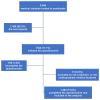Self-Reported Obsession Toward COVID-19 Preventive Measures Among Undergraduate Medical Students During the Early Phase of Pandemic in Jordan
- PMID: 34820347
- PMCID: PMC8606560
- DOI: 10.3389/fpubh.2021.719668
Self-Reported Obsession Toward COVID-19 Preventive Measures Among Undergraduate Medical Students During the Early Phase of Pandemic in Jordan
Abstract
Background: Coronavirus disease 2019 (COVID-19) pandemic and its associated precautionary measures have substantial impacts not only on the medical, economic, and social context but also on psychological health. This study aimed to assess the obsession toward COVID-19 preventive measures among undergraduate medical students during the early phase of the pandemic in Jordan. Methods: Online questionnaires were distributed between March 16, 2020 and March 19, 2020. Socio-demographic characteristics were collected, and self-reported obsession toward COVID-19 preventive measures was assessed using a single question.COVID-19 knowledge, risk perception, and precautionary measures were evaluated using scales. Using the chi-square test, Student t-test, and one-way ANOVA, we assessed the differences in the obsession of students with socio-demographic characteristics and scores of the scales. Results: A total of 1,404 participants (60% were female participants) completed the survey with a participation rate of 15.6%. Obsession with preventive measures was reported by 6.8%. Obsession was significantly more common among women (9.2%) than men (3.3%) and students who attended COVID-19 lectures (9.5%) than those who did not attend such lectures (5.8%) (p < 0.001 and p = 0.015, respectively). Obsessed participants reported significantly higher levels of COVID-19 knowledge (p = 0.012) and precautionary measures (p < 0.001). COVID-19 risk perception had a mild effect size difference but with no statistical significance (p = 0.075). There were no significant differences in the academic levels of participants (p = 0.791) and universities (p = 0.807) between students who were obsessed and those who were not. Conclusions: Obsession is one of the significant but unspoken psychological effects of COVID-19 precautionary measures among undergraduate medical students. Medical schools should be equipped with means to handle pandemic psychological effects.
Keywords: COVID-19; Jordan; knowledge; medical students; obsession; preventive measures; risk perception.
Copyright © 2021 Al-Shatanawi, Sakka, Kheirallah, Al-Mistarehi, Al-Tamimi, Alrabadi, Alsulaiman, Al Khader, Abdallah, Tawalbeh, Saleh, Hijazi, Alnsour and Younes.
Conflict of interest statement
The authors declare that the research was conducted in the absence of any commercial or financial relationships that could be construed as a potential conflict of interest.
Figures
References
-
- Kheirallah KA, Alsinglawi B, Alzoubi A, Saidan MN, Mubin O, Alorjani MS, et al. . The effect of strict state measures on the epidemiologic curve of COVID-19 infection in the context of a developing country: a simulation from Jordan. Int J Environ Res Public Health. (2020) 17:6530. 10.21203/rs.3.rs-39643/v1 - DOI - PMC - PubMed
MeSH terms
LinkOut - more resources
Full Text Sources
Medical



